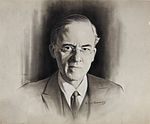No subscription or hidden extras
Read through the most famous quotes from Stafford Cripps
Violent statements and threats cannot provide a solution to the problem. They can only exacerbate feeling and make a clash of forces inevitable. ↗
It is not yet too late for the Indian people to decide on rapid, ordered progress. I can assure them that the British people are as determined upon self-government for India as they are themselves. ↗
Tribune set up as the campaign's newspaper by Cripps and George Strauss survived. However the solution devised by the three men known as the Cabinet Mission Plan was unsatisfactory to the Indian National Congress mainly its principal leaders and instead of having to hold together the emerging one nation Indian National Congress leaders travelled further down the road that eventually led to Partition. that there was every likelihood" that Cripps would unseat Churchill as prime minister.
Sir Richard Stafford Cripps (24 April 1889 – 21 April 1952) was a British Labour politician of the first half of the 20th century. During World War II he served in a number of positions in the wartime coalition including Ambassador to the Soviet Union and Minister of Aircraft Production. After the war he served in the Attlee Ministry firstly as President of the Board of Trade and between 1947 and 1950 as Chancellor of the Exchequer.

